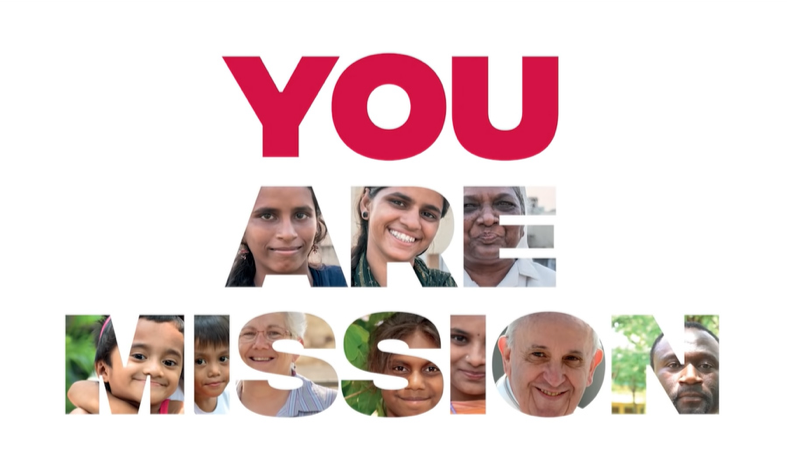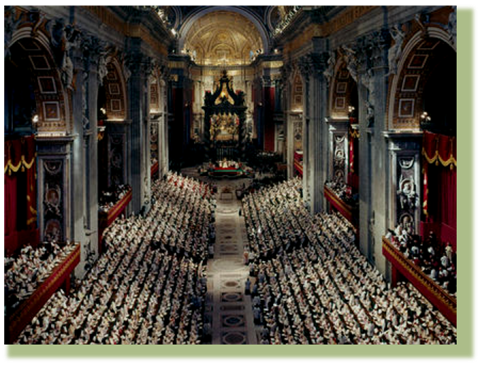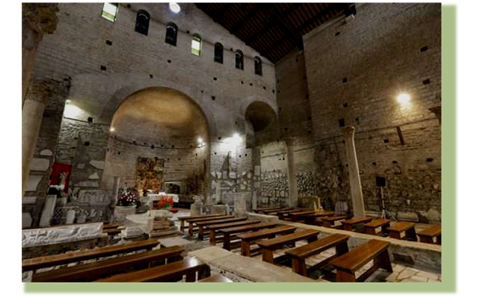They are indeed stories of great emotion, courage, suffering, resilience, relationships, support, hope and much more. It is indeed an attempt to be ‘Unconquered’, the meaning of the Latin word Invictus.
This week’s gospel reading from Mark speaks to me about the Invictus Games, but also about this Sunday being Mission Sunday in World Mission Month.
Jesus summoned the twelve and said to them, "You know that those who are recognized as rulers over the Gentiles lord it over them, and their great ones make their authority over them felt. But it shall not be so among you. Rather, whoever wishes to be great among you will be your servant; whoever wishes to be first among you will be the slave of all. For the Son of Man did not come to be served but to serve and to give his life as a ransom for many." (Mark 10:42-45)
Pope Francis said the following as part of his World Mission Day message:
Every man and woman is a mission; that is the reason for our life on this earth. To be attracted and to be sent are two movements that our hearts, especially when we are young, feel as interior forces of love; they hold out promise for our future and they give direction to our lives.

This year’s theme for the mission month appeal is ‘You are Mission’. It challenges the idea that mission work is only the domain of missionaries overseas, and encourages us all to make a real difference. It is a calling for all people of good will to be co-creators with God for a better world. Pope Francis echoes what the Second Vatican Council said in the document On the Missionary Activity of the Church:
Missionary activity is closely bound up even with human nature itself and its aspirations. For by manifesting Christ, the Church reveals to people the real truth about their condition and their whole calling, since Christ is the source and model to that redeemed humanity, imbued with brotherly love, sincerity and a peaceful spirit, to which they all aspire. (n.8)
That takes me to an online talk I listened to, by Fr Hans Zollner SJ, who was recently in Australia speaking on Creating a Safe Church from Within. During this talk he spoke of the Catacomb Pact made at the end of the Second Vatican Council when 42 bishops met in the Domitilla Catacombs and promised to themselves and each other that they would lead a different life, not as princes of the Church but as servants of the People of God. Zollner then went on to make a statement that the challenge for us now is to make a new Catacomb Pact – involving not only bishops and provincials, but all of the faithful. He said:
As a Church we need to move together. Many among the faithful say the priests and bishops messed it up, so sort it out. This will perpetuate the difficulties. If the People of God as a whole don’t take up the challenge of dealing with this, we will continue with a split, with divisions, with pointing fingers at each other and we will not progress. I had not previously heard of the Catacomb Pact and have since looked it up, and I believe it worth sharing with you, based on the power of the statements in the Pact and of our Sunday readings which speak of a suffering servant, not leading from a position of prestige and power.
I had not previously heard of the Catacomb Pact and have since looked it up, and I believe it worth sharing with you, based on the power of the statements in the Pact and of our Sunday readings which speak of a suffering servant, not leading from a position of prestige and power.
I have made the decision not to shorten the words of the Pact, in the hope that it may provide for you a point of reflection and possible dialogue. I am convinced that it is up to each of us to live a committed life of service. I even wonder if we as the People of God in this diocese could ever form such a pact.
The Pact of the Catacombs (Domitilla) - A poor servant Church
We, bishops assembled in the Second Vatican Council, are conscious of the deficiencies of our lifestyle in terms of evangelical poverty. Motivated by one another in an initiative in which each of us has tried to avoid ambition and presumption, we unite with all our brothers in the episcopacy and rely above all on the grace and strength of Our Lord Jesus Christ and on the prayer of the faithful and the priests in our respective dioceses. Placing ourselves in thought and in prayer before the Trinity, the Church of Christ, and all the priests and faithful of our dioceses, with humility and awareness of our weakness, but also with all the determination and all the strength that God desires to grant us by his grace, we commit ourselves to the following:
- We will try to live according to the ordinary manner of our people in all that concerns housing, food, means of transport, and related matters. (See Matthew 5,3; 6,33ff; 8,20).
- We renounce forever the appearance and the substance of wealth, especially in clothing (rich vestments, loud colours) and symbols made of precious metals (these signs should certainly be evangelical). (See Mark 6,9; Matthew 10,9-10; Acts 3.6 (Neither silver nor gold).
- We will not possess in our own names any properties or other goods, nor will we have bank accounts or the like. If it is necessary to possess something, we will place everything in the name of the diocese or of social or charitable works. (See Matthew 6,19-21; Luke 12,33-34).
- As far as possible we will entrust the financial and material running of our diocese to a commission of competent lay persons who are aware of their apostolic role, so that we can be less administrators and more pastors and apostles. (See Matthew 10,8; Acts 6,1-7).
- We do not want to be addressed verbally or in writing with names and titles that express prominence and power (such as Eminence, Excellency, Lordship). We prefer to be called by the evangelical name of “Father.” (See Matthew 20,25-28; 23,6-11; John 13,12-15).
- In our communications and social relations we will avoid everything that may appear as a concession of privilege, prominence, or even preference to the wealthy and the powerful (for example, in religious services or by way of banquet invitations offered or accepted). (See Luke 13,12-14; 1 Corinthians 9,14-19).
- Likewise we will avoid favouring or fostering the vanity of anyone at the moment of seeking or acknowledging aid or for any other reason. We will invite our faithful to consider their donations as a normal way of participating in worship, in the apostolate, and in social action. (See Matthew 6,2-4; Luke 15,9-13; 2 Corinthians 12,4).
- We will give whatever is needed in terms of our time, our reflection, our heart, our means, etc., to the apostolic and pastoral service of workers and labour groups and to those who are economically weak and disadvantaged, without allowing that to detract from the welfare of other persons or groups of the diocese. We will support lay people, religious, deacons, and priests whom the Lord calls to evangelize the poor and the workers by sharing their lives and their labours. (See Luke 4,18-19; Mark 6,4; Matthew 11,4-5; Acts 18,3-4; 20,33-35; 1 Corinthians 4,12; 9,1-27).
- Conscious of the requirements of justice and charity and of their mutual relatedness, we will seek to transform our works of welfare into social works based on charity and justice, so that they take all persons into account, as a humble service to the responsible public agencies. (See Matthew 25,31-46; Luke 13,12-14; 13,33-34).
- We will do everything possible so that those responsible for our governments and our public services establish and enforce the laws, social structures, and institutions that are necessary for justice, equality, and the integral, harmonious development of the whole person and of all persons, and thus for the advent of a new social order, worthy of the children of God. (See Acts 2,44-45; 4;32-35; 5,4; 2 Corinthians 8 and 9; 1 Timothy 5,16).
- Since the collegiality of the bishops finds its supreme evangelical realization in jointly serving the two-thirds of humanity who live in physical, cultural, and moral misery, we commit ourselves: a) to support as far as possible the most urgent projects of the episcopacies of the poor nations; and b) to request jointly, at the level of international organisms, the adoption of economic and cultural structures which, instead of producing poor nations in an ever richer world, make it possible for the poor majorities to free themselves from their wretchedness. We will do all this even as we bear witness to the gospel, after the example of Pope Paul VI at the United Nations.
- We commit ourselves to sharing our lives in pastoral charity with our brothers and sisters in Christ, priests, religious, and laity, so that our ministry constitutes a true service. Accordingly, we will make an effort to “review our lives” with them; we will seek collaborators in ministry so that we can be animators according to the Spirit rather than dominators according to the world; we will try be make ourselves as humanly present and welcoming as possible; and we will show ourselves to be open to all, no matter what their beliefs. (See Mark 8,34-35; Acts 6,1-7; 1 Timothy 3,8-10).
- When we return to our dioceses, we will make these resolutions known to our diocesan priests and ask them to assist us with their comprehension, their collaboration, and their prayers.
May God help us to be faithful.

I can see how this Pact led by Archbishop Helder Camara of Brazil has influenced Pope Francis. More than 50 years ago leaders in our Church recognised the call of the Gospel and yet we are still struggling to be a church of the poor for the poor.
During this World Mission Month may each of us be drawn to the theme;
You are Mission!
Sorry for the length of the message but I think it to be of value for our prayer and consideration.

